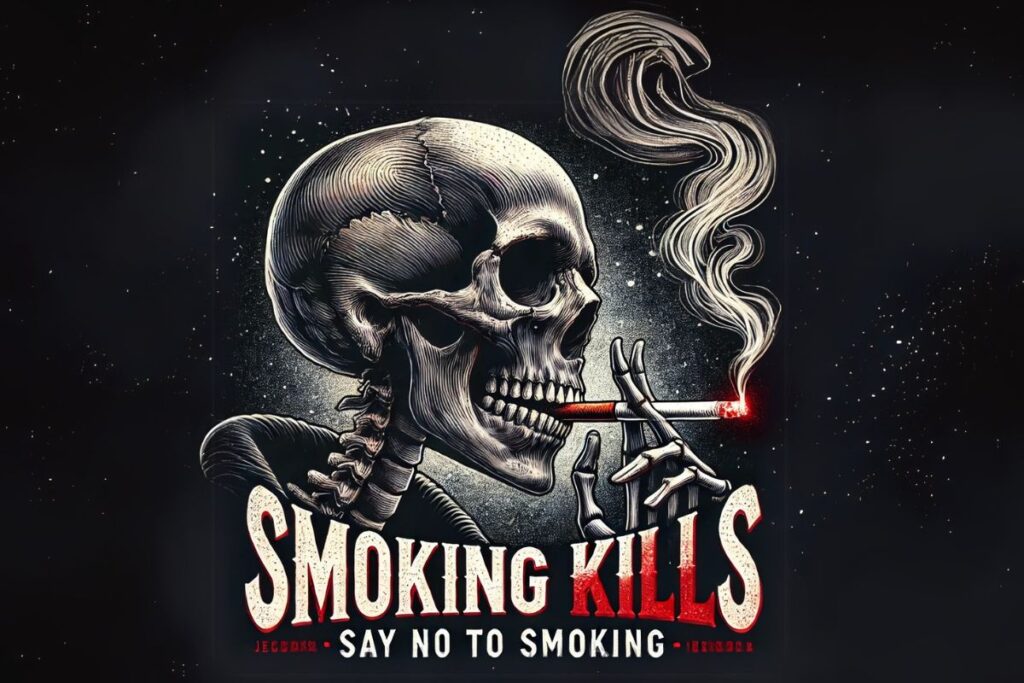“A single puff may seem harmless, but over time, it takes a toll on your lungs, heart, and entire body. Quitting smoking isn’t just about breaking a habit—it’s about reclaiming your life and health.”
Why Is Smoking So Harmful?
Smoking is the world’s largest avoidable cause of death because it damages almost every organ in the body. How it affects your health is as follows:
1. Lungs:
Smoking damages the tiny air sacs (alveoli), resulting in chronic conditions like Chronic Obstructive Pulmonary Disease (COPD) and lung cancer.
2. Heart:
It raises blood pressure, increases cholesterol, and greatly raises the risk of heart attack and stroke.
3. Cancer Risk:
Smoking is linked to cancers of the lung, mouth, throat, esophagus, bladder, and more.
4. Immune System:
Weakens your body’s defenses, making you more susceptible to infections.
5. Skin and Aging:
Smoking reduces oxygen to the skin, leading to premature wrinkles and aging.
What Happens When You Quit Smoking?
The benefits of quitting start almost immediately:
● 20 Minutes After: Heart rate and blood pressure begin to drop.
● 12 Hours After: Carbon monoxide levels in your blood normalize.
● 2 weeks to 3 months: lung function improves, and coughing decreases.
● 1 Year: The risk of heart disease is cut in half.
● 5 Years: Stroke risk drops to that of a non-smoker.
● 10 Years: There is a 50% decrease in the risk of lung cancer.
Every day without smoking is a step toward a healthier future.
Challenges of Quitting Smoking
Nicotine is highly addictive, making it hard to quit. Common challenges include:
● Cravings: intense urges to smoke, especially in the early days.
● Withdrawal Symptoms: Irritability, anxiety, restlessness, and trouble sleeping.
● Triggers: Stress, social situations, or habits tied to smoking.
Your chances of success are increased if you are aware of these challenges and have prepared for them.
How to Quit Smoking Successfully
1. Make a Plan:
● Set a quit date and stick to it.
● Identify triggers and find ways to avoid or manage them.
2. Seek Support:
● Talk to family and friends about your decision to quit.
● Join a support group or counseling program.
3. Use Quit Aids:
● Nicotine Replacement Therapy (NRT): Patches, gums, or lozenges help manage cravings.
● Prescription Medications: Medications like varenicline or bupropion can reduce withdrawal symptoms.
4. Adopt Healthy Habits:
● Exercise regularly to reduce stress and improve mood.
● Drink water and eat healthy snacks to curb cravings.
5. Celebrate Milestones:
● Reward yourself for small victories, like a week or month smoke-free.
How HealthPil Can Help:
At HealthPil, you can get personalized smoking cessation programs, which connect you with specialists who can guide you through every step of quitting. Our teleconsultations make it easy to get support from the comfort of your home.
Myths About Quitting Smoking
1. Myth: It’s too late to quit if I’ve smoked for years.
Truth: Quitting at any age improves your health and extends your life.
2. Myth: I’ll gain a lot of weight if I quit.
Truth: While some people may gain a little weight, the health benefits of quitting far outweigh this.
3. Myth: Nicotine replacement therapy is just as harmful as smoking.
Truth: NRT provides controlled amounts of nicotine without the harmful chemicals in cigarettes.
FAQs About Smoking Cessation:
How long does nicotine withdrawal last?
Symptoms will get worse in the first week of your withdrawal but will start to get better in two to four weeks.
Can I quit without any help?
Yes, but using support systems and quit aids increases your chances of success.
Is vaping a safe alternative to smoking?
Vaping is not safe and can still result in addiction, even though it could be less dangerous.
Can I quit smoking gradually?
Some people prefer to reduce it gradually, but quitting cold turkey is often more effective.
What if I relapse?
Relapsing is common. Learn from the experience and try again with a better plan.
Disclaimer:
This article is for informational purposes only. For personalized advice, consult a healthcare professional.
Take control of your health today. Let HealthPil guide you toward a smoke-free life.

